email us on c.mccarron@minchschool.net and a.hodges@minchschool.net if you would like us to email you any of the resources you see on our blog.
We’ll get round to doing a dropbox soonish! xxx
email us on c.mccarron@minchschool.net and a.hodges@minchschool.net if you would like us to email you any of the resources you see on our blog.
We’ll get round to doing a dropbox soonish! xxx
My teaching practice has changed dramatically over the last 8 months as a result of the Shirley Clarke action research project. If someone said rewind and teach the way you did before… I would leave teaching and open a bookshop (my back-up plan!). I feel invigorated, inspired, supported and excited for the next phase.
This was our final poster – we were tasked with reporting back on Effective Questioning. As part of our presentation, Alison and I got Gloucestershire heads taking part in a ‘Is cheating ever ok – debate’ as well as a 16 x 25 mental maths number talk. If you can’t do it in under a minute…ask a KS2 Minchinhampton pupil! Top tip halving and doubling is the way to go!
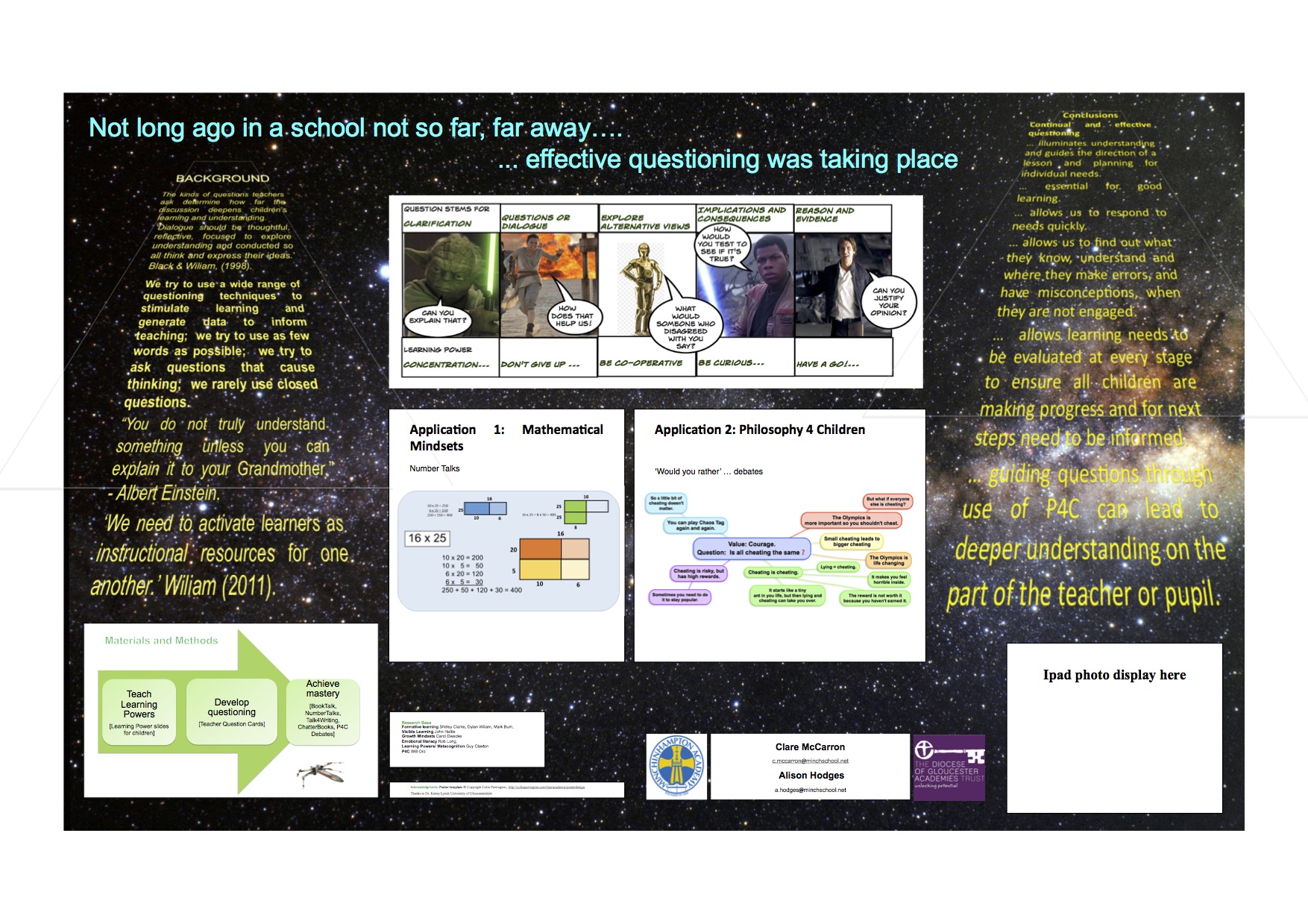
Next steps: To pour our new skills into our school book project (A Portal in Time) with Patron of Reading, John Dougherty. Publication March 2017 by the History Press and book launch 10th June 2017. See our School Book Project blog for further details.
Best reads: Outstanding Formative Assessment by Shirley Clarke, Mathematical Mindsets by Jo Boaler and Number Talks by Sherry Parrish.
Background
‘The kinds of questions teachers ask determine how far the discussion deepens children’s learning and understanding.’ (Wiliam 2008)
After embedding metacognition through learning powers, growth mindset and the learning pit, we worked on higher level questioning.
We trained ourselves using these question sets, a week at a time, until we were fluent in questioning. We team taught in lesson study groups, Japanese style, to hone our lesson delivery.
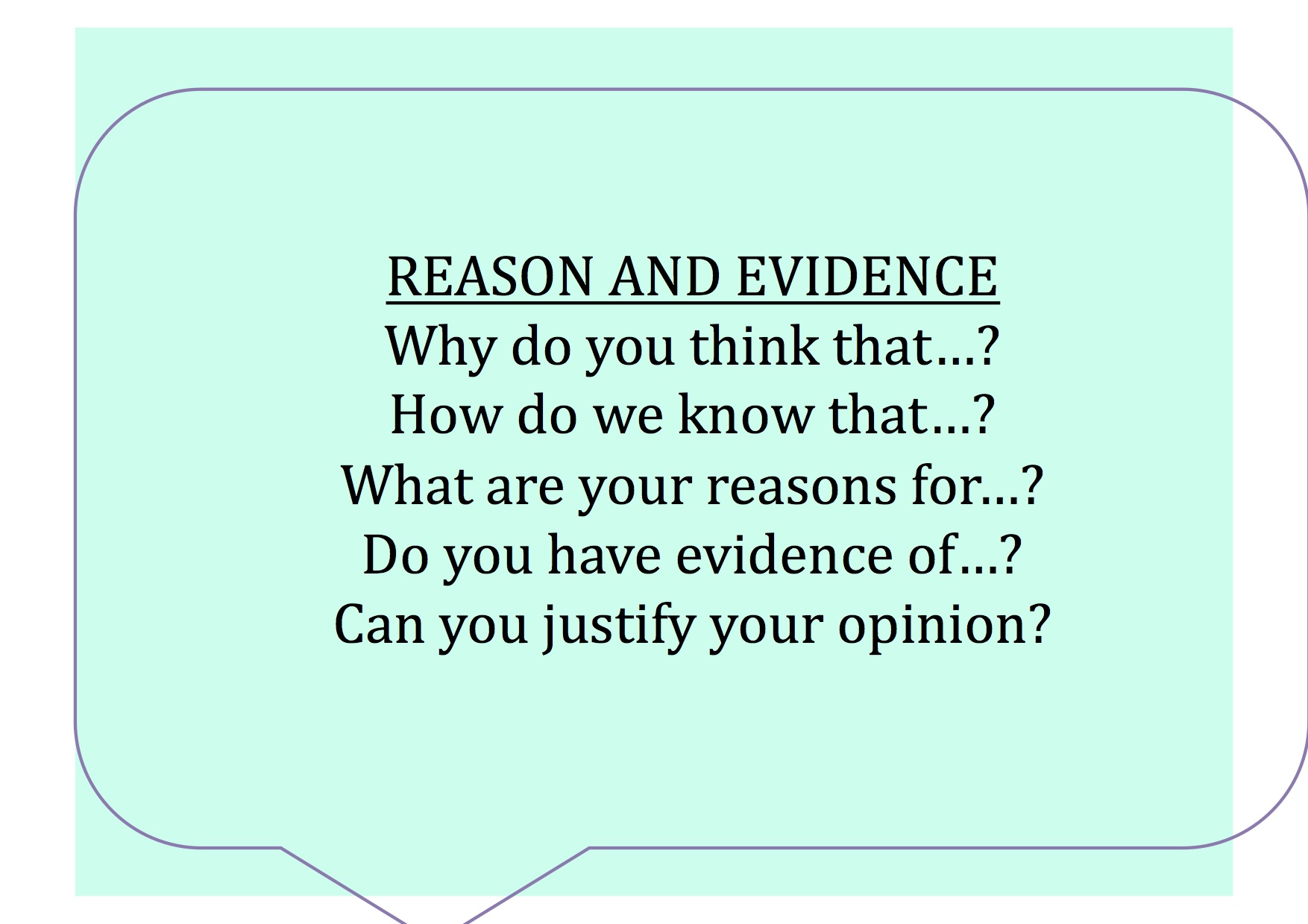
eg. In P4C
Is cheating in the Olympics the same as cheating in tag?
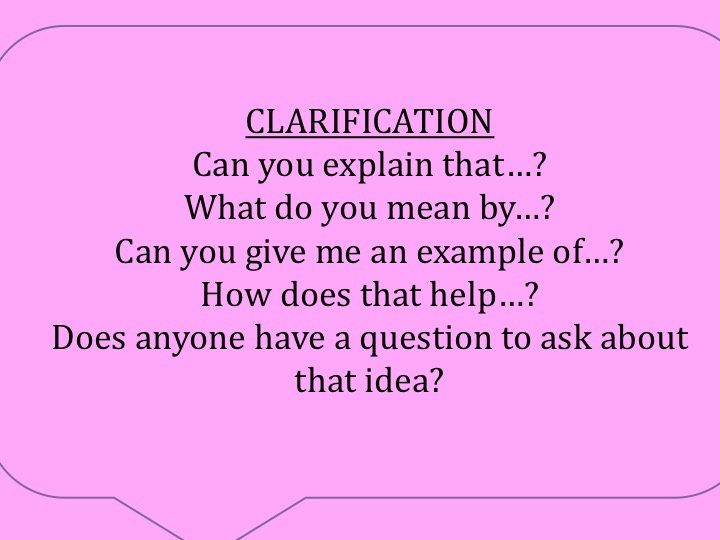
Heated discussion prevailed. Opinions from the two camps included:
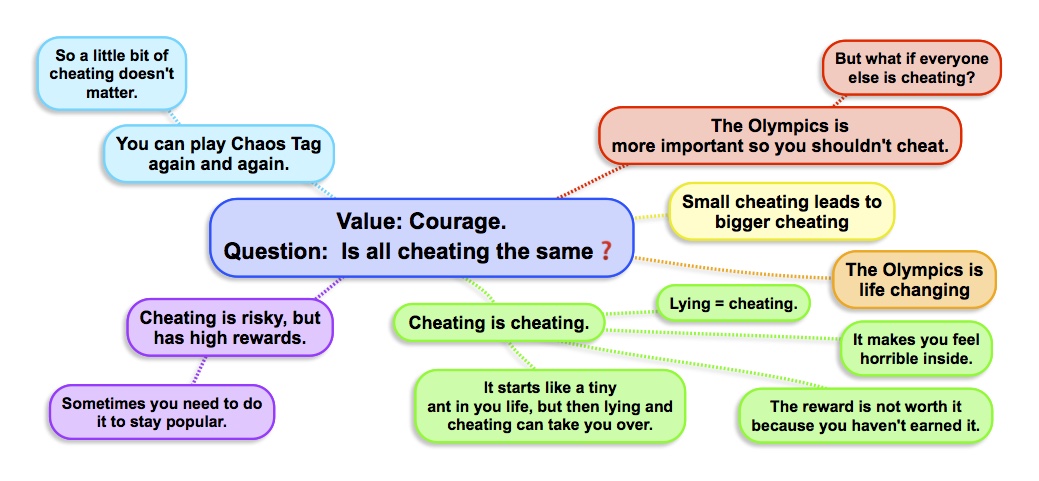



Outcomes:
Effective questioning
… guides the direction of a lesson and planning for individual needs.
… essential for good learning.
… allows us to respond to needs quickly.
… allows us to find out what they know, understand and where they make errors, and have misconceptions, when they are not engaged.
… allows learning needs to be evaluated at every stage to ensure all children are making progress and for next steps need to be informed.
… guiding questions through use of P4C can lead to deeper understanding on the part of the teacher or pupil.
As Wiliam said ‘We need to activate learners as instructional resources for one another.’. An unexpected outcome has been the children taking the questions from us and using them on each other. Pupil autonomy in action and of course they listen to each other more than they listen to adults!
… never dodge a good question…
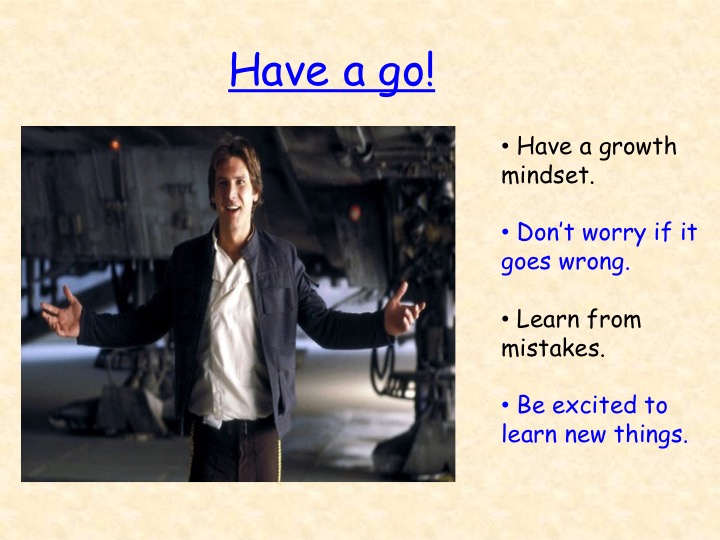
Han says:
“Chewy, my ship is fixed! Let’s get outta’ here. I’m excited to try new things, see new places. Don’t worry if it goes wrong! We’ve learned from our mistakes haven’t we Chewy? We just won’t get involved with The Rebellion again.
Get a growth mindset about you. Don’t just be a walking carpet Chewy. C’mon!”
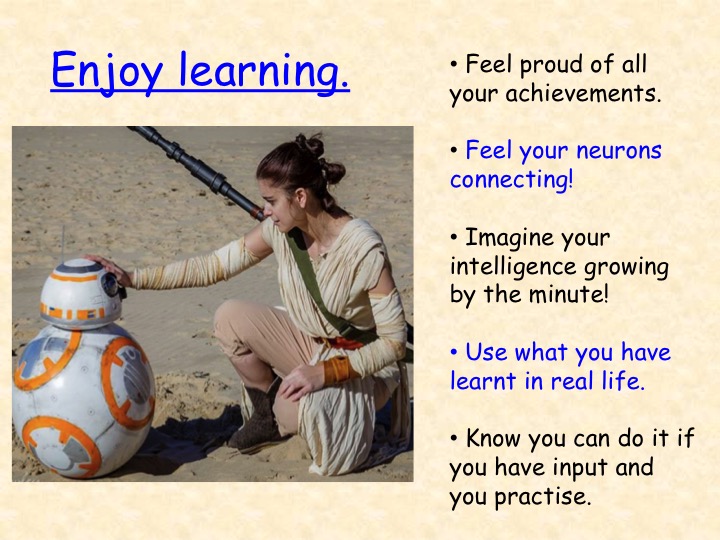
Rey says to BB8:
“You have listened well to my training.
Feel proud of your achievements little BB8. Feel your neurons connecting. Imagine your intelligence growing by the minute!
Use what you have learned in real life to face all of the challenges which lie ahead.
Know what you can do if you have input and if you practice.”
Children can be encouraged to think about pieces of the stiry that might help them enjoy learning!
We’re rolling out the last three Learning Powers thick and fast. Here’s what is coming up. The children are now channelling their inner Yoda, Finn, Han Solo on a daily basis!
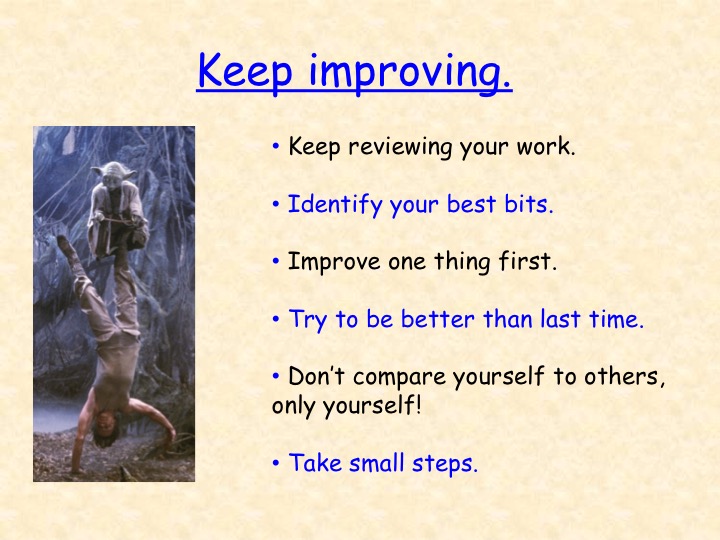
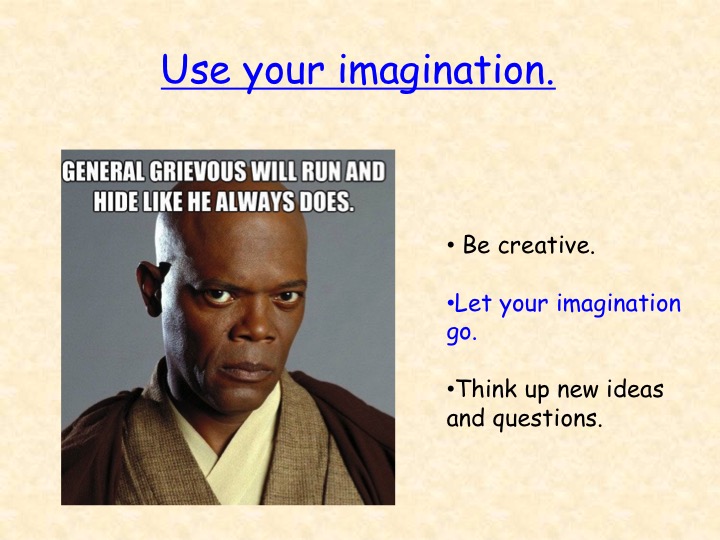 Background
Background
The unveiling of Learning Power 5 coincided with our Japanese style whole-school Lesson Study. This event, which is set to become a termly fixture due to the awesomeness of the experience, took place in week 7 of Term 5. All teaching staff met in our Key Stage groups on Monday after school. Our mission, which we chose to accept, was to plan a problem solving based maths lesson pulling together as many features of growth mindset, Philosophy for Children and formative learning as we could muster. Putting our golden year of staff development towards a cutting edge formative learning experience for the children – and as it turned out – for us.
The Japanese model
‘Japan has succeeded in developing a system that not only develops teachers but also develops knowledge about teaching that is relevant to classrooms and sharable among the members of the teaching profession… When Japanese teachers plan a lesson collaboratively, they treat the result as a joint product whose ownership is shared by all in the group. When one teacher teaches the lesson and the others observe, problems that emerge are generally attributed to the lesson as designed by the group, not to the teacher who implemented the lesson. It thus becomes possible for teachers to become critical without offending their colleague. The discussion can focus more pointedly and deeply on the merits and deficiencies of the lesson and on the process of revising and improving it.’
Improving questioning and talk.
Background.
Previous Shirley Clarke action research teams have found that:
The impact of using more effective questioning is that children’s thinking is more creative and they have to justify their opinions. Confidence is increased and children then are more able to take risks and ask questions.
Introducing deliberate mistakes is one of the ways improving the quality of questioning in order to unpick the misconception.
What we did.
Over the last term we have used a number of deliberate mistakes to great effect and huge hilarity. My favourite was the measuring length glorious mistake where the confidence of the children had built to such a peak that they were shouting at me “Ms. McCarron not like that, can I show you how I would do it?”.
Glorious Mistake: Number Families
This first was the toughest because as a school community we are still relatively new to growth mindset and philosophy for children. It was an emotional roller coaster.
At the end of each maths lesson I ask the children who would like a session in the afternoon to go over what we have done in the morning. During this particular afternoon’s session we were addressing misconceptions which had come up in the morning to do with ‘number families’ – in particular – subtraction.
Q: What addition sum could we do using all 3 numbers? The children had chosen 6, 4 and 10 as our family.
6 + 4 = 10
What else?
4 + 6 = 10
“Now, what subtraction sums could we do with these numbers?”
Some of the children used our rubber sheep. They all had a go at writing a sum on their whiteboards. The children were asked to come up and share their solution.
6 – 4 = 2
“Does it use our family of 3 numbers?”
“Yes it’s the right answer.”
“What about the 10?”
So then we got:
6 – 4 = 10
Lots of shots of “No! That’s not right!” and several volunteers to be the teacher. The child who had written this sum up retreated slightly and looked unsure. He asked if he could sort it out on his whiteboard and sat working on his own for a bit.
There was a lot of counting rubber sheep action for the next few minutes. Lots of chat, giving and receiving advice as they sorted it out. Finally 2 of the group got very excited and said they’d got it.
Coming up to be the teacher, their delivery was very effective as the rest of their group hung on their every word in case they tripped up in their explanation. When they had finished with a very successful explanation of:
10 – 6 = 4
the boy who had retreated beamed up at me and said “I’ve got the last one.” He proudly came up and shared:
10 – 4 = 6
to much ‘ooing’ and ‘aahing’ and checking with rubber sheep.
The next bit of question and answer led the children to the conclusion that there was a rule for adding – you can do it in any order – that didn’t work with subtraction. The second thing they worked out themselves through trial and error was that they needed the biggest number first.
We concluded that we had made 2 mathematical discoveries which we then went on to share with the whole class the next morning.
All in all a very rewarding session. This was a breakthrough moment and with additional practice, these children have been confidently using number families ever since and have understood the concept of an inverse relationship.
Reflection
The children took proper ownership of the task after the first mistake. There were tricky moments for some as they felt upset at being exposed as wrong but a couple of children were so enthused with sorting out the misconception that the whole group was carried along. They were less polite to each other than they are to me and their questions were very direct and effective. They were very focused on getting it right so that they could come up and be the teacher but they were also good at making sure other people had ‘got it’. A good sense of team. I also feel that they understood it and were engaged more deeply than if I had stood at the front and explained the rules.
Next step
This culture of sharing mistakes has built during the term, so that during our measurement unit the children were able to correct my incompetent measurement of height with lots and lots of advice on how to do it correctly and offers of help. From them taking over and trouble shooting my mistakes, we were then able to write our own success criteria for measuring. This has led to some excellent work on co-constructed success criteria which has been fascinating and which Mrs. Hodges and I will share in subsequent posts.
Background
Having unleashed Yoda for Concentration the previous week, anticipation was high for week 2. WHO WAS IT? WHAT WOULD THE SPECIAL POWER BE? All 8 Learning power posters had been stuck up around the classroom but masked for the whole week behind a large question mark! Every day, the children had been speculating. Finally, the moment had arrived.
I work with a mixed attaining group which includes a high number of Pupil Premium children. Part of my remit as a Pupil Premium teacher, is to help those pupil premium children close the gap whilst building their self-esteem. All children can be fragile when they are faced with something new that they know they might ‘fail’ at and when they find that new thing difficult their ‘stickability’ is challenged.
Time to unleash – Rey for ‘not giving up’.
What we did.
Having had great success with measuring length and tearing their hair out at ‘mistakes’ in my method (see next post from me), our next step was to convert measurements.
10 minutes into converting ‘g’ to ‘kg’, I detected some frustration. I invited the most frustrated child to come and unveil the 2nd learning power.
Quivering with excitement, frustration immediately forgotten, he beamed at the sight of Rey running from a burning starship. We spent a giddy few minutes reading the learning story and talking about Rey’s qualities

This time, when asked to highlight pieces of the story which might be skills for ‘Don’t give up!’, the children had made accurate decisions within a couple of minutes.

We looked at the bullet point list we had created and the children talked about how we could use Rey’s Learning Power for what we were getting stuck on. During the discussion, without prompting, the children referred back to Yoda for concentration, making the link between the 2 learning powers and how we should use both.

Outcome
Invigorated, we kept going with our tricky conversions but the mood had changed completely. Our explicit discussion of not giving up lifted the spirits of everyone.
For the rest of the week, we talked about Yoda and Rey and the Learning Powers have become part of our classroom language much more quickly than I anticipated.
Next step
I am under so much pressure to reveal Learning Power 3 to my group! However, year 3/4 then became very busy with the school production so it is over to 5/6 and Mrs. Hodges for the next instalment. Sky class have also been introduced to the Learning Powers over the last few weeks. Time to hear how they have been getting on.
Background
“When tasks are more complex for a pupil, the quality of meta-cognitive skills rather than intellectual ability is the main determinant of learning outcomes.” (Hattie 2009) Hattie looked at 63 studies and deduced an effect size of 0.69 for meta-cognition making it extremely worthwhile. (Shirley Clarke 2014)
Integration of meta-cognition – Learning ‘muscles’ or ‘powers’.
Using a synthesis of Claxton, Costa, Quigley and Clarke we have taken a split screen approach so that the focused learning power has equal status to the knowledge or skill learning objective of the lesson. (Clarke 2014)
What we did
We attached a Star Wars character to each of the 8 learning powers. Each one to be revealed over the next 8 weeks.
On Monday, I revealed the first character: Yoda for concentration. First we shared the ‘learning story’ together. It generated great excitement, with volunteers coming up to do their best Yoda impression.
Then we discussed the story. Was it familiar? Was anything surprising? What messages were there?

The children then highlighted the skills contained within the story.

In our talk partners, we discussed the skills, how they might help us with our elicitation for maths task and broke them down into bullet points.
Over the next few days we kept referring to Yoda, doing impressions, linking what we were doing to the skills needed for concentration.

Outcome
It was so much fun. Our Yoda impersonations improved as did our meta-cognition for concentration. Embedding this metacognitive approach will be a slow burner but if a 5 year old can understand, use and apply a split digraph, then I have full confidence that this will pay off in the long run.
Next step
The next 7 Learning Power posters are now covered up in the classroom – ready to be unmasked! We’ll unveil a character a week until all the categories are known.
Next learning power – ‘Don’t give up’. Who will be our character? Watch this space.